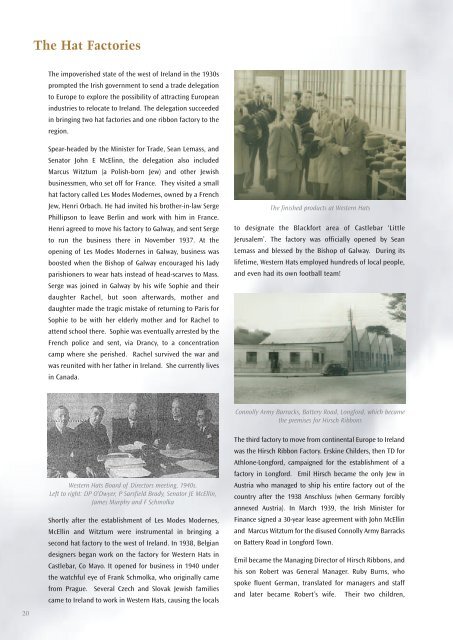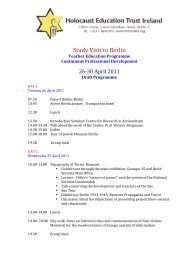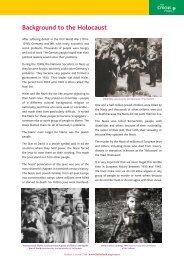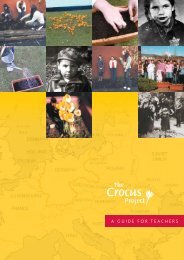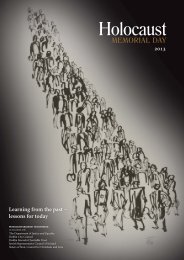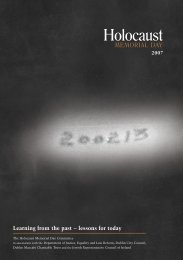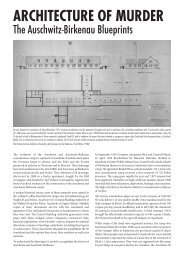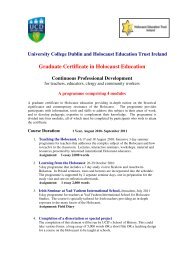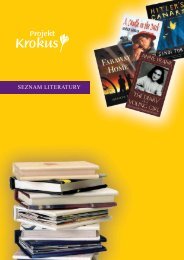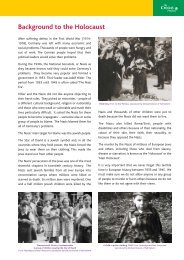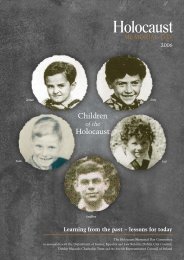Learning from the past ~ lessons for today - Holocaust Education ...
Learning from the past ~ lessons for today - Holocaust Education ...
Learning from the past ~ lessons for today - Holocaust Education ...
Create successful ePaper yourself
Turn your PDF publications into a flip-book with our unique Google optimized e-Paper software.
The Hat Factories<br />
The impoverished state of <strong>the</strong> west of Ireland in <strong>the</strong> 1930s<br />
prompted <strong>the</strong> Irish government to send a trade delegation<br />
to Europe to explore <strong>the</strong> possibility of attracting European<br />
industries to relocate to Ireland. The delegation succeeded<br />
in bringing two hat factories and one ribbon factory to <strong>the</strong><br />
region.<br />
Spear-headed by <strong>the</strong> Minister <strong>for</strong> Trade, Sean Lemass, and<br />
Senator John E McElinn, <strong>the</strong> delegation also included<br />
Marcus Witztum (a Polish-born Jew) and o<strong>the</strong>r Jewish<br />
businessmen, who set off <strong>for</strong> France. They visited a small<br />
hat factory called Les Modes Modernes, owned by a French<br />
Jew, Henri Orbach. He had invited his bro<strong>the</strong>r-in-law Serge<br />
Phillipson to leave Berlin and work with him in France.<br />
Henri agreed to move his factory to Galway, and sent Serge<br />
to run <strong>the</strong> business <strong>the</strong>re in November 1937. At <strong>the</strong><br />
opening of Les Modes Modernes in Galway, business was<br />
boosted when <strong>the</strong> Bishop of Galway encouraged his lady<br />
parishioners to wear hats instead of head-scarves to Mass.<br />
Serge was joined in Galway by his wife Sophie and <strong>the</strong>ir<br />
daughter Rachel, but soon afterwards, mo<strong>the</strong>r and<br />
daughter made <strong>the</strong> tragic mistake of returning to Paris <strong>for</strong><br />
Sophie to be with her elderly mo<strong>the</strong>r and <strong>for</strong> Rachel to<br />
attend school <strong>the</strong>re. Sophie was eventually arrested by <strong>the</strong><br />
French police and sent, via Drancy, to a concentration<br />
camp where she perished. Rachel survived <strong>the</strong> war and<br />
was reunited with her fa<strong>the</strong>r in Ireland. She currently lives<br />
in Canada.<br />
The finished products at Western Hats<br />
to designate <strong>the</strong> Black<strong>for</strong>t area of Castlebar ‘Little<br />
Jerusalem’. The factory was officially opened by Sean<br />
Lemass and blessed by <strong>the</strong> Bishop of Galway. During its<br />
lifetime, Western Hats employed hundreds of local people,<br />
and even had its own football team!<br />
Connolly Army Barracks, Battery Road, Long<strong>for</strong>d, which became<br />
<strong>the</strong> premises <strong>for</strong> Hirsch Ribbons<br />
Western Hats Board of Directors meeting, 1940s.<br />
Left to right: DP O’Dwyer, P Sarsfield Brady, Senator JE McEllin,<br />
James Murphy and F Schmolka<br />
Shortly after <strong>the</strong> establishment of Les Modes Modernes,<br />
McEllin and Witztum were instrumental in bringing a<br />
second hat factory to <strong>the</strong> west of Ireland. In 1938, Belgian<br />
designers began work on <strong>the</strong> factory <strong>for</strong> Western Hats in<br />
Castlebar, Co Mayo. It opened <strong>for</strong> business in 1940 under<br />
<strong>the</strong> watchful eye of Frank Schmolka, who originally came<br />
<strong>from</strong> Prague. Several Czech and Slovak Jewish families<br />
came to Ireland to work in Western Hats, causing <strong>the</strong> locals<br />
The third factory to move <strong>from</strong> continental Europe to Ireland<br />
was <strong>the</strong> Hirsch Ribbon Factory. Erskine Childers, <strong>the</strong>n TD <strong>for</strong><br />
Athlone-Long<strong>for</strong>d, campaigned <strong>for</strong> <strong>the</strong> establishment of a<br />
factory in Long<strong>for</strong>d. Emil Hirsch became <strong>the</strong> only Jew in<br />
Austria who managed to ship his entire factory out of <strong>the</strong><br />
country after <strong>the</strong> 1938 Anschluss (when Germany <strong>for</strong>cibly<br />
annexed Austria). In March 1939, <strong>the</strong> Irish Minister <strong>for</strong><br />
Finance signed a 30-year lease agreement with John McEllin<br />
and Marcus Witztum <strong>for</strong> <strong>the</strong> disused Connolly Army Barracks<br />
on Battery Road in Long<strong>for</strong>d Town.<br />
Emil became <strong>the</strong> Managing Director of Hirsch Ribbons, and<br />
his son Robert was General Manager. Ruby Burns, who<br />
spoke fluent German, translated <strong>for</strong> managers and staff<br />
and later became Robert’s wife. Their two children,<br />
20


